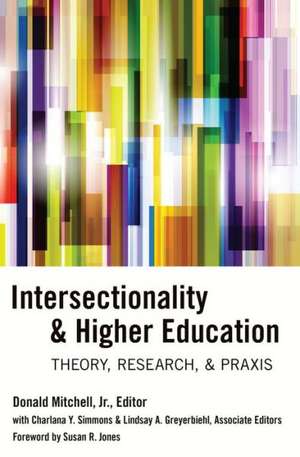Intersectionality & Higher Education
Editat de Donald Mitchell, Charlana Y. Simmons, Lindsay A. Greyerbiehlen Limba Engleză Paperback – 28 sep 2014
Preț: 391.52 lei
Nou
Puncte Express: 587
Preț estimativ în valută:
74.94€ • 81.43$ • 62.99£
74.94€ • 81.43$ • 62.99£
Carte tipărită la comandă
Livrare economică 21 aprilie-05 mai
Preluare comenzi: 021 569.72.76
Specificații
ISBN-13: 9781433125881
ISBN-10: 1433125889
Pagini: 292
Dimensiuni: 150 x 221 x 18 mm
Greutate: 0.42 kg
Editura: Peter Lang Gmbh, Internationaler Verlag Der W
ISBN-10: 1433125889
Pagini: 292
Dimensiuni: 150 x 221 x 18 mm
Greutate: 0.42 kg
Editura: Peter Lang Gmbh, Internationaler Verlag Der W
Notă biografică
Cuprins
Contents: Charmaine L. Wijeyesinghe/Susan R. Jones: Intersectionality, Identity, and Systems of Power and Inequality - Claire Kathleen Robbins/Stephen John Quaye: Racial Privilege, Gender Oppression, and Intersectionality - Allison Daniel Anders/James M. DeVita: Intersectionality: A Legacy from Critical Legal Studies and Critical Race Theory - Nicole Alia Salis Reyes: The Multiplicity and Intersectionality of Indigenous Identities - Heidi Whitford/Carmen L. McCrink: Contextualizing the Higher Education Pathways of Undocumented Students - Samuel D. Museus/Natasha A. Saelua: Realizing the Power of Intersectionality Research in Higher Education - Traci Thomas-Card/Rebecca Ropers-Huilman: Heteronormativity Fractured and Fused: Exploring the College Experiences of Multiple Marginalized LGBT Students - Leah J. Reinert/Gabriel R. Serna: Living Intersectionality in the Academy - Diane J. Goodman: The Tapestry Model: Exploring Social Identities, Privilege, and Oppression from an Intersectional Perspective - Daniel Tillapaugh/Z Nicolazzo: Backward Thinking: Exploring the Relationship among Intersectionality, Epistemology, and Research Design - Shelly A. Perdomo: Raw Tongue: How Black Women and Latinas Bring Their Multiple Identities into Collegiate Classrooms - Susan V. Iverson: Identity Constellations: An Intersectional Analysis of Female Student Veterans - Sheri C. Hardee: 'Letting Us Be Ourselves': Creating Spaces for Examining Intersectionality in Higher Education - Tara L. Affolter: Now You See Me, Now You Don't: Ignoring Intersections and Supporting Silence in Elite Liberal Arts College Classrooms - Marjorie L. Dorimé-Williams: Black ¿ Poor: Understanding the Influence of Class on Black Students' Educational Outcomes - Mitsu Narui: Hidden Populations and Intersectionality: When Race and Sexual Orientation Collide - Jason C. Garvey: Demographic Information Collection in Higher Education and Student Affairs Survey Instruments: Developing a National Landscape for Intersectionality - Valeria Sinclair-Chapman/Sasha Eloi/Sharese King: The Women of Color Circle: Creating, Claiming, and Transforming Space for Women of Color on a College Campus - Betty Jeanne Taylor/Ryan A. Miller/Claudia García-Louis: Utilizing Intersectionality to Engage Dialogue in Higher Education - Patrick N. Troup/Walter R. Jacobs: Huntley House: A 'Post-Black' Living-Learning. Community for African American Men - Maria Oropeza Fujimoto/Miguel U. Luna: Theory to Practice: Problematizing Student Affairs Work through Intersectionality - Robin Phelps-Ward/Thalia M. Mulvihill: PhD Pathways Mentoring Program: A Site to Build Intersectional Praxis - Colette Seguin Beighley/Carrie Simmons/Emily West: Beyond Identity Politics: Equipping Students to Create Systemic Change.














